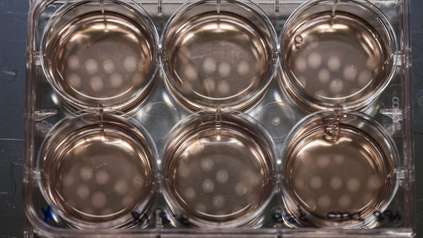100 cancer organoid models developed by Sanger Institute scientists
Researchers at the Wellcome Sanger Institute have developed 100 cancer organoids.The work was co-funded by Cancer Research UK and the Sanger Institute and leads the UK effort as part of the international Human Cancer Model Initiative (HCMI). The organoids will soon be available for researchers, together with associated data including whole genome sequences.
Organoids, where cells self-organise into 3D structures, are a powerful new tool for cancer researchers. The cells, derived from patients tumours and grown in the lab, mirror the cellular complexity and architecture of an individual tumour. Having 100 organoids from patients with three types of cancer begins to reflect the huge diversity of tumours.
The 100 organoids are derived from the tumours of patients with colorectal, oesophageal and pancreatic cancer. Available to researchers worldwide, they will enable studies into cancer development and biology, as well as drug discovery. Researchers will be able to order the organoids via the biorepository ATCC and data for the organoids will be available on the Cell Model Passports website.
Creating 100 organoids is an important milestone for Sanger Institute researchers who have been working closely with Cancer Research UK. The organoids contribute to the HCMI. The international initiative is a collaboration between the Sanger Institute, Cancer Research UK, U.S. National Cancer Institute, and the foundation Hubrecht Organoid Technology. More organoids representing more types of cancer will be created by the HCMI consortium.
“Cancer is so diverse, even within a type or sub-type. We need to reflect that when we are studying it in the lab. Organoids are a great model – enabling us to study how tumours develop and how they respond to treatments.
“Because each organoid represents a tumour of an individual patient, they also represent a step on the journey to personalised medicine. One day it may be possible for an organoid to be created and used as part of specialist cancer care – for example to see which treatments a tumour will respond to. We’re some way off that at the moment, but this project is building the foundations for it to be possible.”
Dr Mathew Garnett Head of the Translational Cancer Genomics group at the Sanger Institute
Working with clinicians, scientists and hospitals across the UK, the teams have established an efficient pipeline to derive and characterize these new models. Cancer Research UK have not only provided funding to support the work but have supported establishment of the Network with the clinical sites as well as agreements and governance for the project.
“A massive achievement of this project has been setting up the networks across the UK to get the tumour tissue. That involves establishing the ethics protocols, working with pathologists and surgeons to collect the samples, and couriers to rush them to the Sanger Institute. To make the organoids we have to get the tissue to the Sanger Institute within 36 hours of surgery – so it’s been a massive challenge. But we’ve built that capability and infrastructure. We are extremely grateful to our collaborators and the patients involved.”
Dr Hayley Francies A senior staff scientist at the Sanger Institute and lead project scientist
The Sanger Institute would like to thank the patients who kindly donated their tissue for this project.
More information
Selected websites
Human Cancer Model Initiative (HCMI)
The Human Cancer Model Initiative (HCMI) is an international effort to develop the next-generation of cancer cell models that better represent the hallmarks and diversity of human cancer. The Sanger Institute is taking a leadership role in this initiative in collaboration with the Cancer Research UK, the U.S. National Cancer Institute, and the foundation Hubrecht Organoid Technology. We will derive and genetically characterise hundreds of new organoid models and make them available to researchers as a transformative resource for the community.
Cancer Research UK
- Cancer Research UK is the world’s leading cancer charity dedicated to saving lives through research.
- Cancer Research UK’s pioneering work into the prevention, diagnosis and treatment of cancer has helped save millions of lives.
- Cancer Research UK receives no government funding for its life-saving research. Every step it makes towards beating cancer relies on vital donations from the public.
- Cancer Research UK has been at the heart of the progress that has already seen survival in the UK double in the last forty years.
- Today, 2 in 4 people survive their cancer for at least 10 years. Cancer Research UK’s ambition is to accelerate progress so that by 2034, 3 in 4 people will survive their cancer for at least 10 years.
- Cancer Research UK supports research into all aspects of cancer through the work of over 4,000 scientists, doctors and nurses.
- Together with its partners and supporters, Cancer Research UK’s vision is to bring forward the day when all cancers are cured.
Wellcome Sanger Institute
The Wellcome Sanger Institute is one of the world’s leading genome centres.
Through its ability to conduct research at scale, it is able to engage in bold and long-term exploratory projects that are designed to influence and empower medical science globally. Institute research findings, generated through its own research programmes and through its leading role in international consortia, are being used to develop new diagnostics and treatments for human disease.
To celebrate its 25th year in 2018, the Institute sequenced 25 new genomes of species in the UK.
Find out more at scion-02.sandbox.sanger.ac.uk or follow us @sangerinstitute on Twitter, Facebook and LinkedIn, or subscribe to our Blog.
Wellcome
Wellcome exists to improve health by helping great ideas to thrive.
We support researchers, we take on big health challenges, we campaign for better science, and we help everyone get involved with science and health research.
We are a politically and financially independent foundation. wellcome.org



